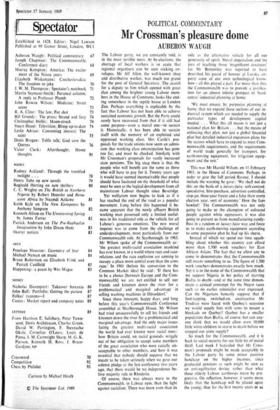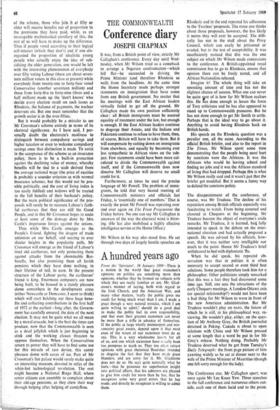Mr Crossman's pleasure dome
POLITICAL COMMENTARY AUBERON WAUGH
The Labour party, we are constantly told, is in the most terrible mess. At by-elections, the shortage of local workers is so acute that regional organisers can be seen sticking en- velopes. Mr Alf Allen, the well-known shop and distributive worker, was much too grand for the post of General Secretary. The search for a deputy to him which opened with great élan among the brighter young Labour mem- bers in the House of Commons, looks like end- ing somewhere in the reptile house at London Zoo. Perhaps everything is explicable by the fact that Labour has not been able to achieve sustained economic growth. But the Party could surely have recovered from that if it still had some purpose—even a moral one—to sustain it. Historically, it has been able to sustain itself with the memory of an exploited and oppressed working class. Mrs Castle's pro- posals for the trade unions now seem an admis- sion that working class emancipation has gone too far, and must be checked. Similarly with Mr Crossman's proposals for vastly increased state pensions. The big snag there is that the people who will benefit are the same as those who will have to pay for it. Twenty years ago 78 it would have seemed inconceivable that people
79 should have hesitated on the threshold of what
80 must be seen as the logical development from all mainstream Labour thought since Beveridge. Yet welfarism now begins to look as if it
81 has reached the end of the road as a popular movement. Long before this happened it be-
82 came apparent that the newly affluent British working man possessed only a limited useful- 82 ness in his traditional role as the vehicle for all Labour's generous emotions. The new moral 83 impetus was to come from the challenge of 83 underdevelopment, most particularly from our Commonwealth role. At Scarborough, in 1963, Mr Wilson spoke of the Commonwealth as: 'the greatest multi-racial association mankind
84 has ever known, in a world where race and race-
84 relations and the race explosion are coming to occupy a place more central even than the arms 85 race.' In 1961 (before his conversion to the 85 Common Market idea) he said : 'If there has to be a choice [between Europe and the Com- monwealth] we are not entitled to sell our friends and kinsmen down the river for a problematical and marginal advantage in selling washing machines in Diisseldorf.'
Since those innocent, happy days, and long before this year's Commonwealth Conference assembled at Marlborough House, Mr Wilson 89 had tried unsuccessfully to sell his friends and kinsmen down the river for a problematical and marginal advantage. And the only major issues facing the greatest multi-racial association the world had ever known were racial ones: how Britain could, on racial grounds, wriggle out of her obligation to accept some members of the great association who were racially un- acceptable to other members, and how it was essential that nobody should suppose that we meant to be taken seriously when we gave our solemn pledge at the last conference two years ago, that there would be no independence be- fore majority rule in Rhodesia.
Of course, there was always more to the Commonwealth, in Labour eyes, than the fight against racialism. There was more even than its
role as the alternative vehicle for all our generosity of spirit. Moral imperialism and the joys of teaching those 'magnificent creatures' (as Mr Bottomley was reported to have described his guard of honour at Lusaka air- port) some of our own technological know- how—all this played a part. Far more than this. the Commonwealth was to provide a justifica- tion for an almost infinite prospect of 'hard- centre' industrial planning at home.
'We must ensure, by purposive planning at home, that we expand those sections of our in- dustrial system which are needed to supply the particular types of development capital needed. . . . What this all means is not just a national plan for Britain . . . but the means of enforcing that plan, not just a global financial plan but detailed industrial expansion plans for the sectors which have to expand to meet Com- monwealth requirements, and the requirements of world trade generally for transport, for earth-moving equipment, for irrigation equip- ment and the rest.'
This was Mr Harold Wilson, on 11 February 1963, in the House of Commons. Perhaps, in
order to give the full period flavour, I should include the warning he gave : 'We shall not do this on the basis of a laissez-faire, soft-centred, speculative, hire-purchase, advertiser controlled, stop-go, three-year freeze and a false thaw every election year, sort of economy.' How the fans howled! The Commonwealth was not only going to make us the champion of coloured people against white oppressors, it was also going to prevent us from manufacturing candy- floss in a random or laissez-faire way and force us to make earth-moving equipment according to some purposive plan he had up his sleeve.
Instead of which we spend our time squab- bling about whether this country can afford more than 1,500 work vouchers for East African A.sians. The fact that we allow any to come in demonstrates that the Commonwealth still means something to us. The figure of 1,500 work vouchers demonstrates exactly how much. Yet it is in the name of the Commonwealth that we support Nigeria in her policy of starving Biafra to death—and at the same time demon- strate a cynical contempt for the Negro races such as no earlier colonialist ever expressed. Can the Nigerians honestly suppose that if foot-tapping, switched-on, unattractive Mr Trudeau were faced with Quebec's secession we would supply him with arms to mount a blockade on Quebec? Quebec has a smaller population than Biafra, of course, but can any- one think that we would allow even 10,000 little white children to starve to death before we stopped our arms supply?
So much for the Commonwealth, and it is back to social security for our little bit of moral thrill. Last week I hazarded that Mr Cross- man's proposals might be made acceptable to the Labour party by some minor punitive handicap on the higher incomes, since graduated pensions as such might be seen as an anti-egalitarian device, rather than what those elderly Labour carthorses mean by pro- gressive. On reflection, however, it seems more likely that the handicap will be placed upon the young; thus for the first twenty years or so of the scheme, those who join it at fifty or older will receive benefits out of proportion to the premiums they have paid, while, as an inescapable mathematical corollary of this, the rest of us will have to make up the difference. Thus if people voted according to their logical self-interest (which they don't) and if one dis- regarded the proportion of idealistic young people who actually enjoy the idea of sub- sidising the older generation, one would be left with the interesting phenomenon of everybody over fifty voting Labour (there are about seven- teen million voters in this class at present) while everybody from twenty-one to forty-four voted Conservative (another seventeen million) and those from forty-five to forty-nine (three and a half million) made up the 'don't knows' who decide every election result on such issues as Rhodesia, the balance of payments, the nuclear deterrent etc. But one must remember that the growth sector is in the over-fifties.
But it would probably be a mistake to see Mr Crossman's scheme entirely in terms of Its electoral significance. As I have said, I per- sonally doubt the electorate's readiness to distinguish between compulsory savings and higher taxation or even to welcome compulsory savings once that distinction is made. To assist in the acceptance of the scheme as an insurance policy, there is to be a built-in protection against the declining value of money, whereby benefits will be tied to a scale derived from the average national wage (the price of equities Is probably a sounder criterion as with normal Insurance schemes, but this would not be pos- sible politically, and the cost of living index is too easily fiddled) and widows will be treated to the full benefits of their husband's policy. But the main political significance of the pro- posals will surely be to reassure Labour's faith- ful carthorses that they are still the Good People, and in this Mr Crossman hopes to undo at least some of the damage done by Mrs Castle's impetuous forays against the unions.
Thus while Mrs Castle emerges as the People's Friend, fighting the dragon of trade unionism on our behalf, and soaring to ever dizzier heights in the popularity polls, Mr Crossman will emerge as the friend of Labour's tired old carthorses, not only protecting them against attacks from the abominable Bar- barella, but also promising them all lavish pensions which they have done nothing, in their lifetime of toil, to earn. In the present structure of the Labour party, the carthorses' friend is king. Enormous computers are now being built, to be housed in a stately pleasure dome somewhere in the development areas (either Newcastle or Doncaster, I seem to think) which will start belching out these huge bene- fits and collecting contributions in the first half of 1972 at the earliest—long after, the Govern- ment has carefully ensured, the date of the next election. It may not be quite what we all mean by a moral crusade, but is the best the times can produce, now that the Commonwealth is seen as a dead jellyfish which is just beginning to stink and the working classes threaten to oppress themselves. When the Conservatives return to power they will have to find some use for this miracle of rare device, this sunny pleasure dome with caves of ice. Part of Mr Crossman's fun palace would surely make quite an interesting museum, devoted to relics of the white-hot technological revolution. The rest might become a National Bingo Hall, where senior citizens can assemble to complain about their old-age pensions, as they chew their way through helping after helping of candyfloss.



































 Previous page
Previous page